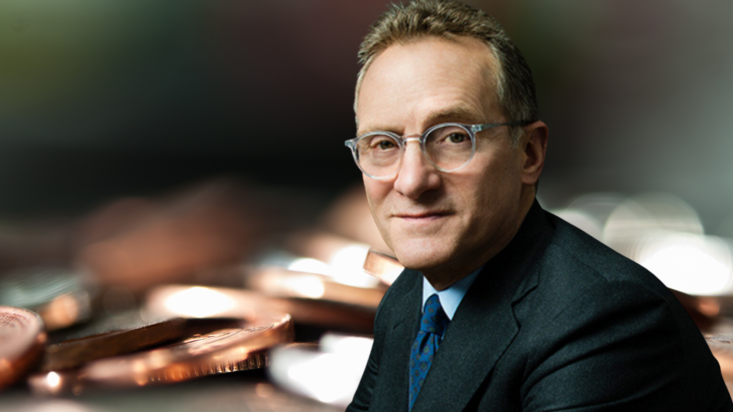Howard Marks on market dislocation and remarkable credit opportunities
Howard Marks, co-founder of Oaktree Capital Management, the world’s largest distressed debt investment manager, wants investors to know there is a seismic change occurring in markets, with the last 40 years of economic conditions not only unwinding but reversing.
Markets are currently in a what he calls a “zone of reasonableness”, with investors best advised to assume their normal posture and avoid mistakes stemming from natural bias according to the 77-year old investor. But with an economic “sea change” set to prompt dislocation and rejuvenate fixed-income opportunities, this could be credit’s moment – and a bargain hunter’s dream.
That period was defined by declining and low interest rates, sparking greater competition amongst lenders and a scramble for yield, with investors moving into riskier securities as returns became harder to find. And many in the investment world today have never experienced anything else, Marks noted, although that’s about to change.
“I believe that declining and super low interest rates are not the norm, and they are not what people should expect in the next decade,” he said on a recent investor call co-hosted by Oaktree and Spire Capital, which are partnering on three new managed funds targeting Australian wholesale investors. He noted that interest rates fell a whopping 20 percentage points from 1980 to 2021, including hitting zero for the first time in 2009 and staying there for seven years.
“That was an unusual period in which the Fed kept rates incredibly low, initially to solve the problem of the global financial crisis, and then, in my opinion inexplicably, they left them there too long,” Marks said. “A zero federal funds rate is an emergency measure; I don’t think we’ve had an emergency for seven years.”
New environment, new winning strategies
This environment has been exceptionally challenging for lenders and for credit, essentially changing the rules of the investment game, Marks said, with low interest rates increasing the value of assets and decreasing the cost of capital.
“Of course, if assets appreciate and the cost of buying them declines, then people who buy assets using borrowed money do especially well. That’s what’s happened in the last 40 years taken together.”
It’s no coincidence, he added, that highly leveraged investment strategies like private equity began to take off around 1980. But while “we shouldn’t be surprised that the use of leverage was successful”, he said, it would be unwise to bet on its continued success in a future marked by higher interest rates.
“Albert Einstein said that the definition of insanity is doing the same thing over and over again and expecting different results,” he said.
“I believe it’s another form of insanity to do the same thing in different environments and expect the same result. Leveraged asset ownership in a period of rising asset prices and declining capital costs is an obvious winner, but doing so in a period of steady valuations and interest rates is not so obvious a winner. I believe that people have to look for winners in different strategies than the ones that succeeded before.”
‘Not a time to be clever’
A big part of Marks’ reputation as the “Warren Buffett of credit” hinges on five big calls he’s made since 2000, all during times when the market was “either crazy high or crazy low,” he told investors.
And for all the pundits attempting to predict central bank moves and time markets, Marks stressed that calling the market rarely works. Despite his five famous bets, including calling the dot-com bubble and warning of the global financial crisis months before it struck, he said, “if I had tried to do it 50 times in 50 years … it would probably converge with a 50-50 coin toss”. In other words, “you can’t do it often and expect to be successful.
“One of the most important goals in investing is to avoid mistakes – not to be a genius, but to avoid mistakes,” he said. “When there’s nothing clever to do, the mistake lies in trying to be clever. As to the broad macro level of the market, I think this is not a time to be clever.”
Nonetheless, the changing conditions will create opportunity, with dislocations already emerging in some sectors, particularly enterprise software, health care and commercial real estate. This creates ideal conditions for credit investors to earn equity-like returns with lower risk, and for bargain hunters to benefit from selloffs.
What Marks is looking for, he said, is good companies with bad balance sheets. He noted that opportunities are arising in three sectors that are already feeling the pinch: enterprise software, health care and commercial real estate.
Key to Oaktree’s approach is so-called second-level thinking, or variant perception – “trying to see things in a more sophisticated, more nuanced, more insightful way than the average person”, Marks said.
“The essence of investing consists of buying things for less than they’re worth,” he said. “The average investor makes mistakes from time to time. Our goal is to take advantage of those mistakes.”
And while the dislocations, and opportunities, arising in such reasonable markets will likely be temporary, “in that temporary moment that usually lasts some months, if not years – that’s when we get our opportunities”, Marks said.
“We don’t try to predict how long they’re going to last. But we are determined to take advantage of them today, if they exist today, as we believe they do.”
*This story was originally published in The Inside Investor.











